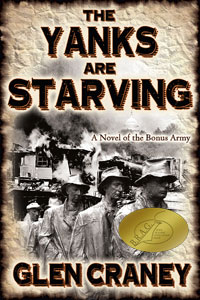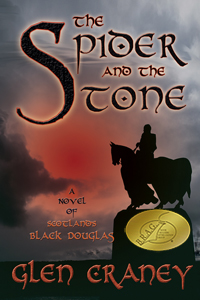I often get asked how I choose my stories and characters. The truth is, I don’t—they choose me.
One night several years ago, I awoke from a vivid dream of a robed priestess walking amid the ruins of a mountain castle. As this spectral woman came toward me, I heard the word “crusade” being chanted. Around her feet sprouted dozens of crosses that shifted between possessing two and three horizontal beams. They seemed to mark the location of forgotten graves. Bathed in a lucent radiance, the woman beckoned me with outstretched arms and pleaded, “Peace, child, let the Light.” Then, the dream ended.
The next morning, I hurried to the library to research these strange crosses. Months later, I was climbing the heights of Montsegur, the Cathar Masada in the Ariege region of southwestern France. That desolate mount and its haunting castle ruins looked strikingly similar to the jagged landscape in my dream. All across Cathar country I found the double cross on graffiti. Known as the Cross of Lorraine, it had been adopted as the rallying symbol for the French Resistance during World War II. I also learned that the triple cross was associated with the medieval papacy and had been used during medieval times as a secret parchment watermark called the Catharist Cross, or Cross of Light.
Popes…crusade…resisting invaders in France… Cathar heretics… Light.
Back home, I launched into my first novel, The Fire and the Light, set in 13th century Occitania during the brutal Albigensian Crusade. My main character was Viscountess Esclarmonde of Foix, a venerated Cathar noblewoman who participated in public disputations against Catholic legates. Pope Innocent III condemned her ex cathedra in Rome for being an influential heretic. Her name meant “The Light of the World,” and an old Occitan tradition says she still haunts the ruins of Montsegur.
I don’t know why I was chosen to tell her story. But having dutifully performed the task, I assumed my sleep would no longer be disturbed.
I was wrong.
Not long thereafter, I had another shuddering dream. In it, I was a mounted knight caught in a death struggle along a stream with a black-robed hag who attacked me with a sickle. The scene then shifted to a celebratory photograph of seven knights standing around a seated monarch. Below this tableau, a caption appeared: “Americans Aid the King at Bannockburn.”
None of this made sense. If I had heard of the Battle of Bannockburn, its significance had long since been lost to my school days. And the caption was even more bizarre. Robert the Bruce won his unlikely victory against the English in 1314, nearly five hundred years before the United States was even an idea.
Two months later, I was in Scotland walking along the burn of Bannock with Stirling Castle looming in the distance. The stream looked similar to the one in my dream. Suddenly, it dawned on me: I had been given another writing assignment.
The result was The Spider and the Stone, my novel about the Black Douglas, a fearsome warrior and loyal comrade of Robert Bruce. And I eventually deciphered the meaning of the dream’s suggestion that Americans aided King Robert at the battle. You’ll have to read the novel for that revelation.
By then, I had learned to keep a notebook on my bedside table. And it wasn’t long before another book-initiating dream came to me, one that was audible and to the point: The word “SATOR” kept ringing in my ear.
What could that mean? I asked on waking. My first thought was the Japanese word for enlightenment, Satori. But that trail led me nowhere.
A few weeks later, I came across a reference to an ancient palindrome called the SATOR square, which can be read the same backward and forward. Since Roman times, the word square was thought to possess magical properties. Yet its message has eluded sages and historians for centuries.
The SATOR square pulled me into its web, and the result was my third novel, The Virgin of the Wind Rose. In that dual-period mystery-thriller, I spin the SATOR letters to reveal a shocking revelation about Christopher Columbus.
Now, if only this mysterious muse would start whispering entire novels to me, word for word. But that hasn’t happened yet, and the writing remains a mortal grind.



Leave a Reply